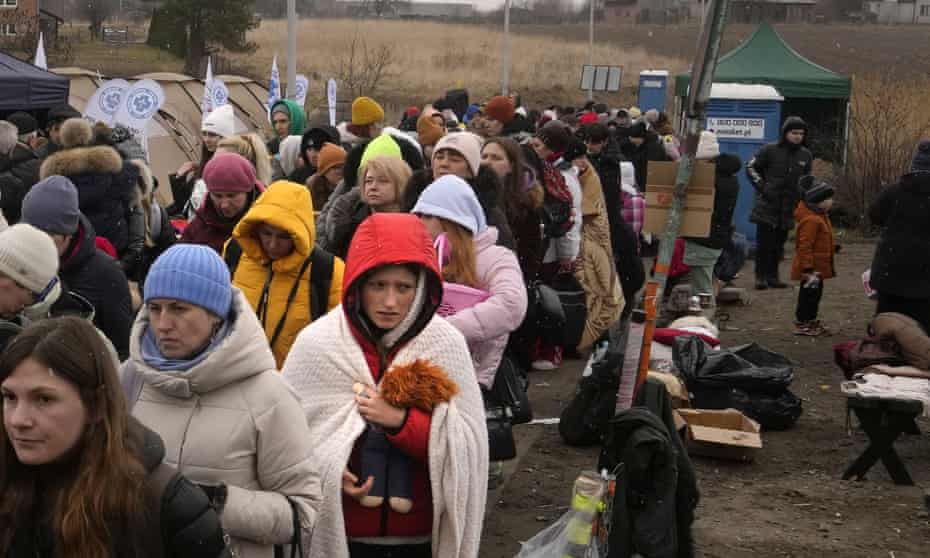Tuesday
Ilya Kaminsky, the Ukrainian-American poet whose poem “We Lived Happily During the War” I shared last week tweeted four days ago that a friend in Kyev was translating Greek poet C.P. Cavafy’s poem “City,” even as the city was under bombardment. While the choice of the poem didn’t at first make sense to me, I put it in dialogue with an Adrienne Rich poem and now think I’ve figured out why the poet turned to it.
Cavafy’s poem touches on a choice that many Ukrainians are agonizing over at the moment: do I stay or do I leave? If “City” didn’t at first seem applicable to Ukraine’s current situation, however, it’s because the poem essentially makes the point that leaving for a better life will do you no good if you remain the same person. It’s a theme graphically explored by Milton in his Paradise Lost description of Satan that I wrote about yesterday:
…from the bottom stir
The Hell within him, for within him Hell
He brings, and round about him, nor from Hell
One step no more than from himself can fly
By change of place…
Here’s the poem, which has been translated by Edmund Keeley:
City
You said: “I’ll go to another country, go to another shore,
find another city better than this one.
Whatever I try to do is fated to turn out wrong
and my heart lies buried like something dead
How long can I let my mind moulder in this place?
Wherever I turn, wherever I look,
I see the black ruins of my life, here,
where I’ve spent so many years, wasted them, destroyed them totally.”You won’t find a new country, won’t find another shore.
This city will always pursue you.
You’ll walk the same streets, grow old
in the same neighborhoods, turn gray in these same houses.
You’ll always end up in this city. Don’t hope for things elsewhere:
there’s no ship for you, there’s no road.
Now that you’ve wasted your life here, in this small corner,
you’ve destroyed it everywhere in the world.
While the poem is grim, I hear something else in it when I think of the Ukrainian translator turning to it. Perhaps the city being attacked and the people being attacked reminds him or her—let’s say her—just how precious she finds both city and life. Perhaps she considers staying because she is reconnecting with a heart that she realizes she has buried. The prospect of death can do that.
Comparing the poem with Rich’s makes clear how much one has a choice, even in the most adverse of circumstances. Here’s Rich’s poem:
Prospective Immigrants: Please Note
Either you will
go through this door
or you will not go through.If you go through
there is always the risk
of remembering your name.Things look at you doubly
and you must look back
and let them happen.If you do not go through
it is possible
to live worthilyto maintain your attitudes
to hold your position
to die bravelybut much will blind you,
much will evade you,
at what cost who knows?The door itself makes no promises.
It is only a door.
Unlike Cavafy’s poem, Rich’s deals specifically with people leaving the country under external duress. Somewhat like Robert Frost in “The Road Not Taken,” Rich notes that it’s not clear which decision is better: each has a cost. One might think that, if one’s life is threatened, the choice is automatic, but Rich notes that this is not so:
If you do not go through
it is possible
to live worthilyto maintain your attitudes
to hold your position
to die bravely
And in fact, I’ve seen interviews with Ukrainian women choosing to stay (fighting-age men do not have a choice). They may realize that, even in the face of death, they can live worthily, maintain their attitudes, hold their positions—and if they must die, die bravely. If, before the invasion, they felt they were wasting their lives, this threat to their independence has restored perspective. Recalling that freedom is worth fighting for and even dying for can help people rediscover a purpose to their lives.
Further note: Just yesterday Kaminsky tweeted again that a friend—perhaps the same one—was translating Seamus Heaney’s poem “Casualty,” which is about 13 Northern Irish Catholics who were shot in a 1972 protest march. Kaminsky wrote,
A friend in besieged city of Kyev is translating Seamus Heaney right now, while there are explosions outside: “It was a day of cold raw silence, wind-blown” And that is how it is this afternoon.
The entire stanza is only too relevant as it describes the coffins emerging from a church and of the mourners bonding “like brothers in a ring.” Here it is:
It was a day of cold
Raw silence, wind-blown
surplice and soutane:
Rained-on, flower-laden
Coffin after coffin
Seemed to float from the door
Of the packed cathedral
Like blossoms on slow water.
The common funeral
Unrolled its swaddling band,
Lapping, tightening
Till we were braced and bound
Like brothers in a ring.
